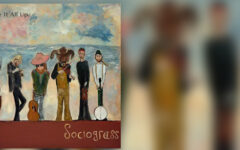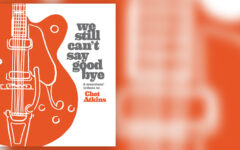
First things first: Merle Monroe is no relation to Bill. By blood, that is. Musically, however, there are some definite influences from the Father of Bluegrass, as there are from the band’s other namesake, Merle Haggard. As you see, Merle Monroe isn’t just one person, but instead a new group led by Tim Raybon and Daniel Grindstaff. The band has recently released its debut album on Pinecastle, entitled Back to the Country.
If Raybon’s name sounds familiar but you can’t quite place him, it’s because until now, he’s most often served as a sideman in bluegrass music. He’s the brother of Marty Raybon, with whom he has performed for many years in both country and bluegrass circles. He’s launched this venture with banjo player Daniel Grindstaff, another alumnus of Marty’s band, and who has also spent time with Jesse McReynolds and Bobby Osborne. The band is rounded out by Derek Deakins (fiddle), Josh Doss (guitar), and Jayd Raines (bass), though the album personnel are a bit different.
The album is enjoyable from start to finish, with some of the smoothest and tightest playing and singing I’ve heard recently on a bluegrass album. There’s a preciseness to everything – both music and vocals – that’s not always present in bluegrass music, reminding listeners that what you don’t play is just as important as what you do play. The country influence may be just a bit heavier than the bluegrass – just listen to the excellent cover of Haggard’s Hungry Eyes. Simple guitar accompaniment through most of the song along with Raybon’s sincere vocals make the song come to life before the listeners’ eyes. Also from the Haggard songbook is album opener Movin’ On, a rip-roarin’ trucking song with nice harmonies on the chorus.
Quite a few songs here are originals from Raybon. One of my favorites is Whipporwill, one of the grassier numbers on the album. Clever turns of phrase like “that letter in black and white, it turned my heart blue,” convey a heartbreak song that seems inspired by the sound of the Osborne Brothers. Also from Raybon’s pen are The Kindest Man, a sweet ode to a beloved grandfather with a rolling, banjo-guided melody, and Beautiful Kentucky, a gentle waltz with a “coming home” theme dedicated to the state most beloved by bluegrass. Again, there seems to be an Osborne Brothers influence here, particularly on the high harmonies.
Bobby Bond’s Back Where It’s At is another “coming home” song, though it’s more of a note of thankfulness for the ability to find relaxation and peace in the country. It’s an enjoyable mid-tempo number, with nice fiddling from guest (and album co-producer and engineer) Stephen Burwell. Roger Miller’s This Town takes the exact opposite approach; the hot picking mirrors the singer’s readiness to get out of a tiresome small town where “things are so bad that the weeds won’t grow.” It’s one of those songs that’s great to hear on an album but is sure to be amazing live as the band gets to show off.
Any traditional-leaning bluegrass album worth its salt wouldn’t be complete with a good Gospel song, and Merle Monroe doesn’t disappoint. He Will Roll You Over the Tide, from popular Gospel songwriter Kyla Rowland, is just about perfect. If it’s not on next year’s IBMA ballot, I’ll be surprised. Blessed City, another from Raybon’s pen, is also excellent, with fine southern Gospel-style harmonies and a bouncy melody accompanying lyrics that anticipate the joys of heaven.
Back to the Country is good, good stuff. Though a few of the songs are covers, most of the numbers on the album are new to bluegrass, which is always exciting. Look for Merle Monroe to make some big noise at next year’s festivals and awards shows – their music certainly deserves it.
For more information on the group, visit their website. Their new album is available from several online retailers for purchase, or on Airplay Direct for radio programmers.







